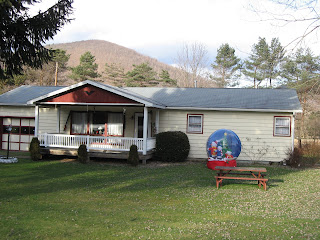
Last week I met my friend Natasha, a cancer doctor, for dinner. I hadn’t seen her in five months. In that time, she’d finished her Ph.D., a 10 year task. While she’s done with the work, she won’t officially be a Ph.D. until she gets the signed documents back from Moscow.
“That could take a year,” she said.
She shared with me the secret places where she spends time with her lover, Vladimir. Every weeknight after work, they walk on a tree-lined sidewalk on the edge of the city. It runs along a major road. Across the street rise tall apartment buildings in a dense residential area. On the other side, is a narrow strip of cafes, hotels, casinos and a church of Jesus Christ of Latter Day Saints, with red neon glittering signs. Behind them, the white peaks of the mountain range rose up in a beautiful skyline.
While the upper-floor residents of the apartment buildings probably enjoyed a wonderful view of the mountains, I asked why there weren’t tall buildings, or residences on the side of the street closer to the mountains.
“It’s a park on that side, so building is not permitted,” she said.
As we walked, the sky colored and then darkened around the white mountains, a beautiful site. When it became dark, she took me to her and Vladimir’s favorite café. It looked like a standard wooden, a-frame building, with some twinkling lights out front. But inside, it was surprising warm and pleasant, with a stone fireplace, animal skins on the walls, and male waiters in black uniforms with folded white towels.
Rabbit was the house specialty and Natasha always orders grilled lamb ribs. They also had a menu of almost 200 cocktails. We sat across from the bar and I found it fascinating to watch the bartender make layered drinks – drinks in which each element remained separate from the others – looking like layers of colored sand. I asked him how he did it and he said it was a secret. After I took pictures and asked several questions, he made Natasha and I each a layered, non-alcoholic cocktail as a gift.
The waiter instructed us how to drink. We had to put the glass to our lips, and drink it slowly, but without pause.
“Over a period of 45 seconds they told us.”
By doing so, we tasted the first layer of juice, which slowly flowed into the second flavor, then the third and the fourth.
When we walked out into the darkened sky, I noticed the full moon rising over the mountains. Natasha pointed out the bulleye, the natural wonder in which the moon was surrounded by a perfect circle of black sky, then a circle of clouds.
Natasha had teared up at the thought of me leaving. “So many people are going,” she said. “And I have fewer and fewer people to talk to.” She said that only eight people out of her high school class of 24 remained in the country. As we walked down the street to meet Vladimir, where they frequently rendez-vous in secret, the eye looking down at us from the sky seemed to tell us that everything would be alright.
“That could take a year,” she said.
She shared with me the secret places where she spends time with her lover, Vladimir. Every weeknight after work, they walk on a tree-lined sidewalk on the edge of the city. It runs along a major road. Across the street rise tall apartment buildings in a dense residential area. On the other side, is a narrow strip of cafes, hotels, casinos and a church of Jesus Christ of Latter Day Saints, with red neon glittering signs. Behind them, the white peaks of the mountain range rose up in a beautiful skyline.
While the upper-floor residents of the apartment buildings probably enjoyed a wonderful view of the mountains, I asked why there weren’t tall buildings, or residences on the side of the street closer to the mountains.
“It’s a park on that side, so building is not permitted,” she said.
As we walked, the sky colored and then darkened around the white mountains, a beautiful site. When it became dark, she took me to her and Vladimir’s favorite café. It looked like a standard wooden, a-frame building, with some twinkling lights out front. But inside, it was surprising warm and pleasant, with a stone fireplace, animal skins on the walls, and male waiters in black uniforms with folded white towels.
Rabbit was the house specialty and Natasha always orders grilled lamb ribs. They also had a menu of almost 200 cocktails. We sat across from the bar and I found it fascinating to watch the bartender make layered drinks – drinks in which each element remained separate from the others – looking like layers of colored sand. I asked him how he did it and he said it was a secret. After I took pictures and asked several questions, he made Natasha and I each a layered, non-alcoholic cocktail as a gift.
The waiter instructed us how to drink. We had to put the glass to our lips, and drink it slowly, but without pause.
“Over a period of 45 seconds they told us.”
By doing so, we tasted the first layer of juice, which slowly flowed into the second flavor, then the third and the fourth.
When we walked out into the darkened sky, I noticed the full moon rising over the mountains. Natasha pointed out the bulleye, the natural wonder in which the moon was surrounded by a perfect circle of black sky, then a circle of clouds.
Natasha had teared up at the thought of me leaving. “So many people are going,” she said. “And I have fewer and fewer people to talk to.” She said that only eight people out of her high school class of 24 remained in the country. As we walked down the street to meet Vladimir, where they frequently rendez-vous in secret, the eye looking down at us from the sky seemed to tell us that everything would be alright.
















